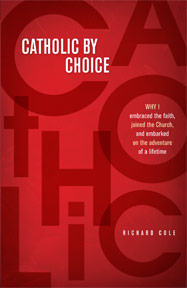Going through my files, I found this reflection for Thanksgiving that I gave at St. Austin parish, a few years after my conversion. That was a decade ago, but if I had to write it again, I think I’d say pretty much the same things.
Jesus said to his disciples: As the Father loves me, so I also love you. Remain in my love. If you keep my commandments, you will remain in my love, just as I have kept my Father’s commandments and remain in his love. – John 15:9-10
Today’s Gospel is, in a way, about gift giving. And today’s holiday is about giving thanks. We have many reasons to be thankful. But I won’t bore you with the details. If you want a list, you can check the newspapers. You can check the 6:00 news.
Instead, I thought, let’s cut to the chase. Let’s focus on just one reason. One of the biggies why we should all be grateful. Something we can all agree upon. I decided that it could be the simple fact that this Thanksgiving, the world and most of us are still here.
Today is a good day. It’s a day. Once again, the sun came up, right on schedule. We came to church. We’re still alive. I know — it might seem like I’m grasping at straws here, trying to think of something positive to say. But as time goes by, I’m increasingly aware of the simple fact that God in his almighty power could pull the plug on the universe anytime he wanted. We’re all on life support. He brought the universe into existence. He could take it all out. Mountain ranges could wink out of existence if He winked, and He hasn’t. Not yet, anyway. The more I think about this fact, the more it seems that the continued existence of the universe and ourselves is a real cause for thanksgiving. Let’s say the average heart beat is 75 per minute. Now, this little reflection of mine is going to be about 450 heartbeats long. The Mass will be about 4,500 heartbeats long. There’s about 500 of us sitting here in this church today, so for this one hour, God will be listening, watching over a quarter of a million heartbeats. A quarter of a million heart beats and in between each one, for a single moment, for a second, God is pausing in his eternity, considering perhaps whether to allow the next heart beat to occur. And then, so far, he has said for each one of us, “Yes.” For one more beat, anyway. Yes. And our lives are made possible only by a long succession of yeses, a billion yeses, God saying yes … yes …yes to our existence until the final moment of our physical lives when at last he says, “no more.”
But as long as we live, God is also saying more than just yes. He’s saying “I love you.” With every heart beat that he gives us, he is saying “I love you.” A quarter of a million times this hour for everyone here in this church this morning, “I love you. ”
And what do we say when some says, “I love you”? Do we say, “That’s nice. Thank you.” Do we just give thanks? Of course not. The best response, the worthy response, the happiest response if at all possible, is always to say, “I love you, too.” An exchange of gifts.
Love is a true gift. It’s not private. It is not property. And like all true gifts, it’s something we can’t keep for ourselves. We pass it along. This is what Christ is telling the apostles and us in today’s reading. He’s saying “This is my love which I receive from the Father. Pass it along. Don’t keep it for yourselves. Pass it along, to God and to one another.”
To follow Christ, to accept his love, we have to give, not get. The bumper sticker says “He Who Has The Most Toys When He Dies, Wins.” But Christ reminds us of the very real possibility that he who has the most toys when he dies, dies. In heaven, nobody has pockets.
What’s more, Christ shows us that we have to throw down our nets to follow him. In other words, abandon not just our possessions, but the means we have to acquire them. This is a toughie because we all have our nets. We have nets for money. Nets for love. We even, most of us, have nets for God Himself. Our spiritual ambitions, our good intentions, can become a net. But, of course, we can’t catch God in a net. God is the net, and He’s already caught us. We can slip through the meshes. We can struggle away. But he’s always here, all around us, drawing us in with the net of his love.
God emptied Himself to create the universe. He gave Himself to us as Christ. And now he wants it all back. Because he knows that his gift, the gift of love, has to be returned. Has to be passed along and shared.
So let me share with you a little story. Let me give it away. Three years ago, I attended my first Thanksgiving Mass at St. Austin. I was in the RCIA then. I could barely spell Catholic. I remember when we were asked to present our gifts, and suddenly the church was filled with this sort of excited rustling sound of 500 grocery bags ¾ paper and plastic — being lifted up and carried forward. As I stood up with my own little bag of canned beans, I looked across the church, watching this bucket brigade of grocery bags being passed up the altar steps, and I thought, “Oh. I get it. Maybe. This is the Kingdom of Heaven everyone’s talking about. It’s where you say, ‘Here. Take this. Take everything. Take everything I have. It’s yours.’ The Kingdom of Heaven is where we can give and give and give and give and give until at last we’re free.”
What’s more, the best gifts, the true gifts are always what we get from someplace else, someone else, and pass along. I’m happy to say that there’s not a single original thought in this reflection today. For the past 400 heart beats, you’ve been listening to stolen property. A lot of ideas have been lifted from a wonderful book, The Gift by Lewis Hyde. Other ideas have been taken from a lot of you sitting here today. Some of you know who you are and some of you don’t. I’m not going to name any names because I assume that all those great ideas weren’t yours to begin with — the great ones anyway. Like me, you’re probably just passing them along. So in the same way, I’m passing along, or passing back, whatever I’ve received. This reflection is a gift exchange, a way to say thank you to all of you in this parish, to say thank you to God.
But we have to remember: Saying thank you to God is never enough. We say “I love you.” This is what we can do today at this thanksgiving Mass with our prayers and our grocery bags. It’s what we can do at every Mass, of course, which is always a Eucharist, a thanksgiving. For a lifetime, second by second, God is saying to each of us, “I love you. Here. Have another heart beat. I love you.” And by passing this gift and all his living gifts along to others, we can say, as Christ has taught us to say, “I love you, too.”

